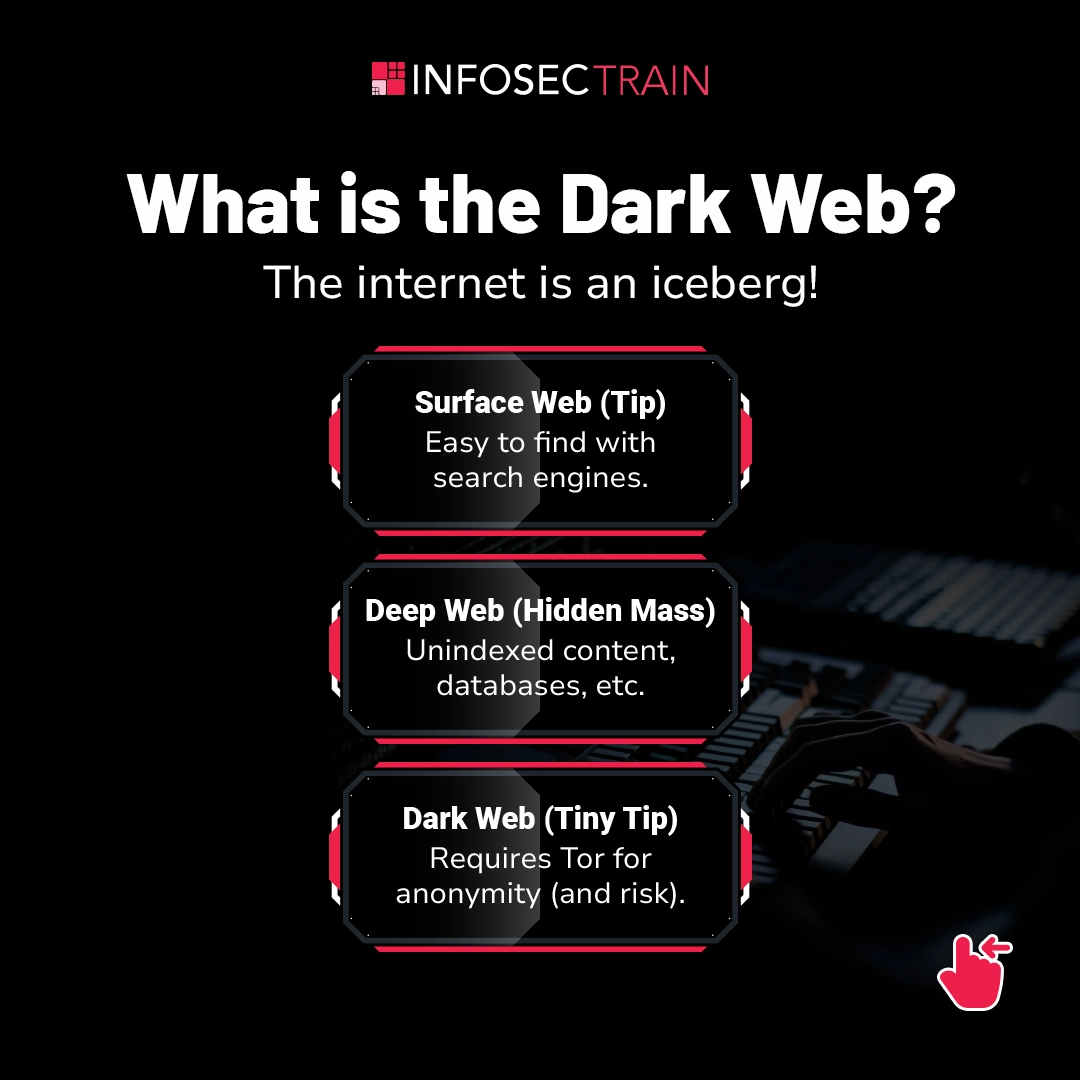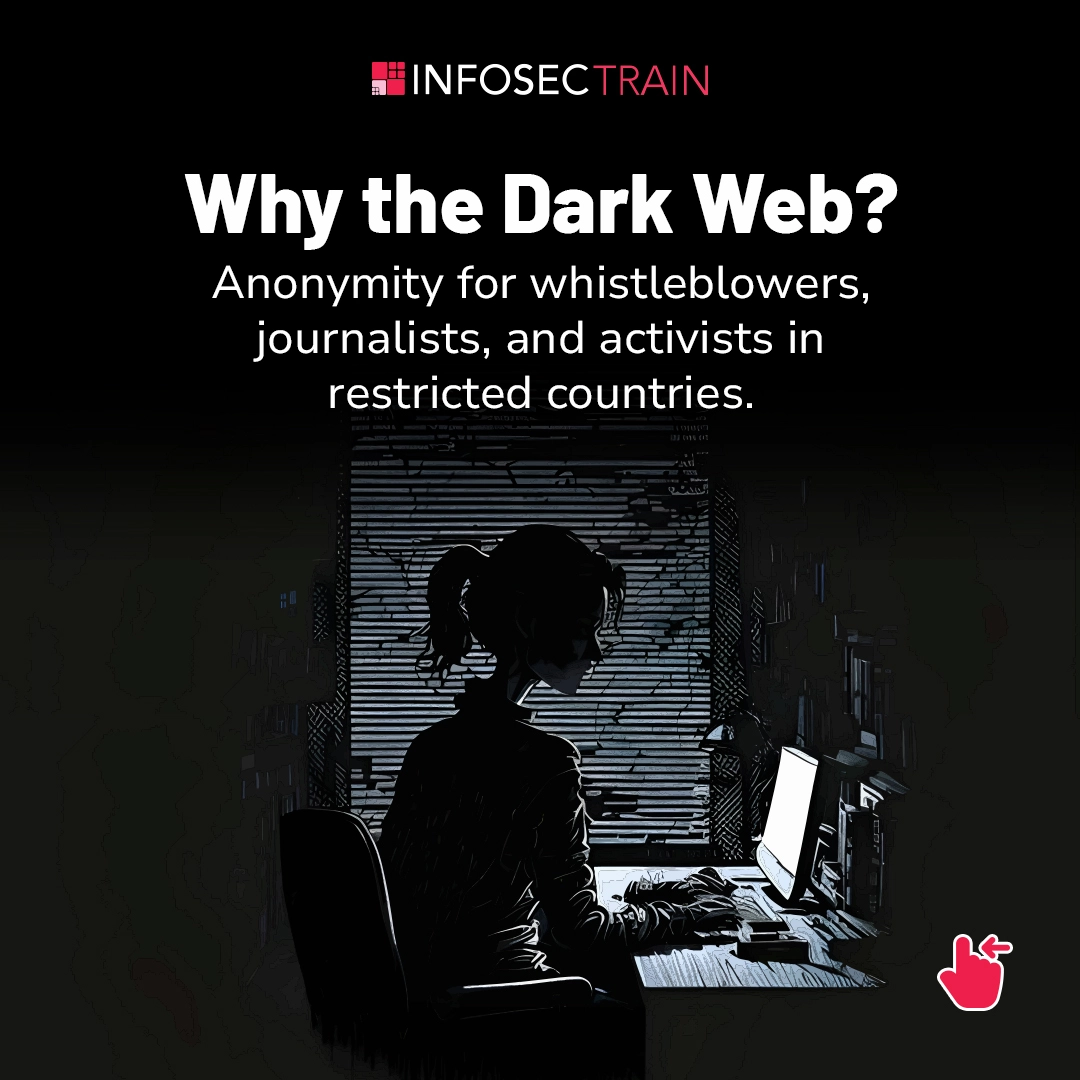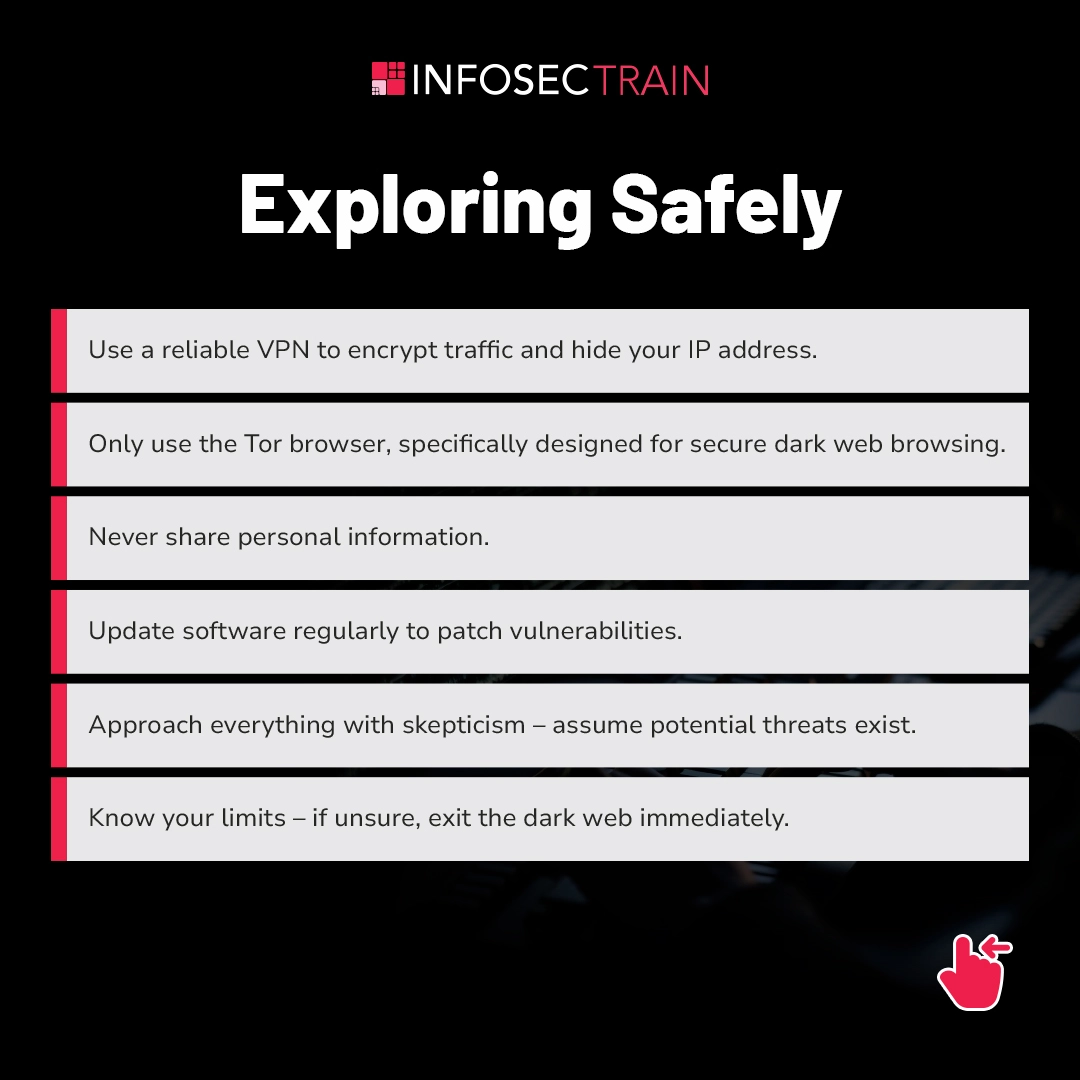The Dark Web: What it is and How to Stay Safe?
The internet we access daily, with its numerous websites and readily available information, is known as the ‘surface web’ or ‘clear web’. However, a hidden layer exists beneath this readily accessible surface – the dark web. Often associated with secrecy and potential misuse, the dark web can facilitate illegal activities. But believe it or not, there are also good reasons why people might use the dark web.

This blog post discusses the dark web, exploring its definition, potential risks, and, most importantly, how to access the dark web safely?
Table of Contents
What is the Dark Web?
Why Does the Dark Web Exist?
The Dark Side of the Dark Web
Essential Safety Measures for Exploring the Dark Web
How can InfosecTrain Help?
What is the Dark Web?
First, Let’s distinguish between two frequently confused terms: Deep Web and Dark Web. These terms represent distinct portions of the internet.
- The Deep Web is a giant hidden part of the internet with tons of web pages that search engines can’t find. This includes password-protected areas of websites, academic databases, and content dynamically generated upon request.
- The Dark Web requires specialized software to be accessed. These websites utilize unique domain extensions (like .onion) and operate on top of anonymizing networks such as

Why Does the Dark Web Exist?
The Dark Web’s anonymity offers legitimate benefits for various users:
- Journalists and Whistleblowers: They can use the Dark Web to securely communicate and share sensitive information with sources or organizations without fear of retaliation.
- Activists in Oppressive Regimes: The Dark Web can provide a platform for dissent and communication without government censorship in countries with limited internet freedom.
- Privacy-Conscious Individuals: The Dark Web caters to those seeking anonymity online for everyday browsing and communication.

The Dark Side of the Dark Web
Unfortunately, the anonymity that empowers legitimate users also attracts malicious actors. Here are some potential risks associated with the Dark Web:
- Illegal Activity: The Dark Web serves as a platform for illicit trade in goods and services, such as narcotics, firearms, and stolen data.
- Scams and Fraud: Fraudulent websites and scams are prevalent, preying on unsuspecting users seeking illegal goods or services.
- Malware: Many Dark Web links can lead to malware-infected websites that can steal personal information or damage devices.
- Law Enforcement Concerns: Participating in unlawful actions on the Dark Web can result in legal repercussions.
Essential Safety Measures for Exploring the Dark Web

If you have to explore the Dark Web, prioritizing security is paramount. Here are some dark web safety tips:
- Use a Good VPN: A Virtual Private Network (VPN) secures your online traffic through encryption and masks your IP address, providing an additional layer of anonymity beyond Tor. Choose a reputable VPN provider with a strong track record of security and a no-logging policy.
- Only Use Tor Browser: Standard web browsers are not suitable for the Dark Web. Use the official Tor Browser, specifically designed for anonymized browsing on the Dark Web.
- Beware of Unverified Links: Exercise extreme caution when clicking on links in Dark Web forums or marketplaces. They might lead to malicious websites or malware traps.
- Never Enter Personal Information: Avoid entering any personal information, including your name, email address, or financial details, on any Dark Web website.
- Use a Disposable Email Address: Create a separate email address specifically for Dark Web exploration. Avoid using your primary email address.
- Update Software Regularly: Staying up-to-date with security patches for your operating system, web browser, and other software helps keep you safe from online threats.
- Have a Reliable Antivirus: A strong antivirus program with real-time protection can help detect and prevent malware infections from Dark Web links.
- Approach with Skepticism: Assume everything on the Dark Web is a potential threat. Be wary of any offers or deals that seem too good to be true.
- Know Your Limits: If you feel uncomfortable or unsure about anything, it’s best to err on the side of caution and exit the Dark Web entirely.
The Dark Web is a double-edged sword. It can provide legitimate benefits for some users but also carries significant security risks. Understanding these dangers and implementing safety measures is crucial for anyone venturing into the Dark Web.
Also read- Mysteries of the Dark Web
How can InfosecTrain Help?
InfosecTrain offers a comprehensive range of cybersecurity training courses designed to cater to various experience levels and areas of interest. Whether you’re a complete beginner seeking an introduction to cybersecurity fundamentals or a seasoned professional looking to enhance your expertise in specific areas like ethical hacking or penetration testing, InfosecTrain has a course for you.
By investing in InfosecTrain’s cybersecurity training courses, you take control of your online security and confidently navigate the vast internet, venturing into its hidden corners only when absolutely necessary and with the proper precautions in place.
TRAINING CALENDAR of Upcoming Batches For CEH v13
| Start Date | End Date | Start - End Time | Batch Type | Training Mode | Batch Status | |
|---|---|---|---|---|---|---|
| 11-May-2025 | 28-Jun-2025 | 09:00 - 13:00 IST | Weekend | Online | [ Close ] | |
| 31-May-2025 | 06-Jul-2025 | 19:00 - 23:00 IST | Weekend | Online | [ Open ] | |
| 07-Jun-2025 | 13-Jul-2025 | 09:00 - 13:00 IST | Weekend | Online | [ Open ] | |
| 21-Jun-2025 | 27-Jul-2025 | 19:00 - 23:00 IST | Weekend | Online | [ Open ] | |
| 06-Jul-2025 | 16-Aug-2025 | 09:00 - 23:00 IST | Weekend | Online | [ Open ] |







 1800-843-7890 (India)
1800-843-7890 (India)